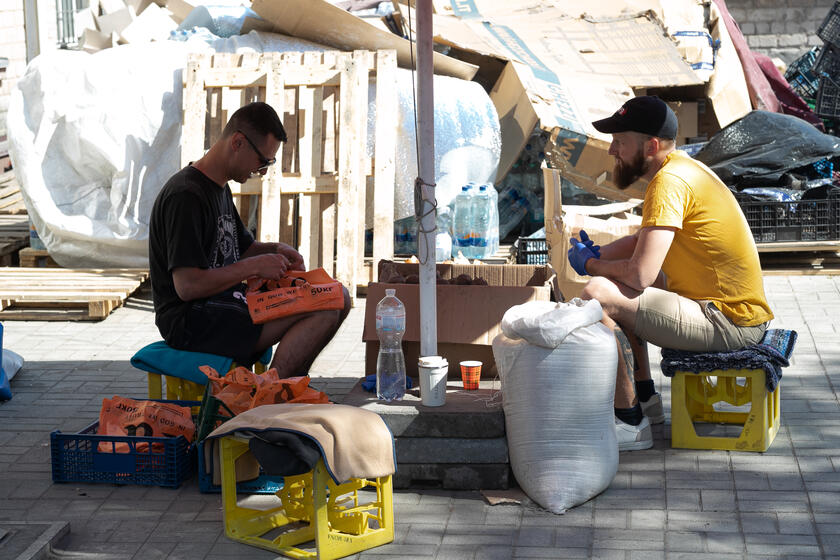Johanniter Extends Assistance to Ukraine

Berlin, 20. May 2022
Projects focusing on integration and psychosocial care have started in Ukraine, in neighbouring countries, and in Germany.
The war in Ukraine has been going on for three months now. Peace negotiations have been suspended and there is no end in sight to the fighting. For millions of people, this means unspeakable suffering. They have lost family members and their homes, and have experienced terrible things. In western Ukraine, in the neighbouring states and in Germany, they are seeking protection from the violence and atrocities.
Joerg Luessem, Member of the Federal Board of Johanniter-Unfall-Hilfe, says: "It is our task to enable people to arrive in a foreign region. To this end, we help in Ukraine, the neighbouring countries and in Germany with accommodation, food, medical and psychological assistance, but also with support services for integration in the new homeland".
Johanniter's Activities in Ukraine

About eight million people in Ukraine are on the run. Cities such as Dnipro in the east or Chernivtsi in the west of the country have become meeting points for hundreds of thousands. In the region around Chernivtsi, near the Romanian border, there are at least 200,000 refugees. In Dnipro, up to 2,000 people arrive daily from embattled areas such as Mariupol, Kharkiv or the Donbass.
"All these people need shelter, food, water and medical care," says Ruben Baudisch, Programme Officer of Johanniter International Assistance, who has just returned from a fact-finding trip to western Ukraine. Since the beginning of the war, Johanniter and its partner ELEOS have been providing food, water, hygiene products, baby food, and nappies. In the past three months, Johanniter has already sent 700 tons of relief supplies to Ukraine, Moldova, and Romania.
In the coming weeks, Johanniter International Assistance will focus on providing aid to internally displaced persons in Ukraine. In eleven cities, such as Dnipro, Poltava or Butcha, Johanniter is helping more than 3,000 families with daily food packages, meals, and hygiene items, as well as with psychosocial services. "Many displaced people have experienced traumatic events that absolutely need to be treated and processed," says Baudisch.
Adequate accommodation with appropriate staff is also needed. Together with its partner, Johanniter is examining how the communities can be supported in rehabilitation and renovation. In the long term, the renovated facilities are to be used as women's shelters for victims of domestic violence as well as for psychosocial care.
Medical aid

At the same time, Johanniter continues to provide medical facilities in Ukraine with medicines and medical supplies. In the past weeks, more than 40 medical facilities across the country have already been supplied. "This continuous aid is still urgently needed," reports Alexander Plegutsa, chief physician at the reference hospital in Chernivtsi. The hospital was already responsible for one million people before the war began, and now around 200,000 new arrivals have joined them. In order to care for them, they are dependent on further deliveries of medicines. Thus, the hospital will receive six tons of medical supplies and 1.5 tons of medicine from Johanniter in the coming days.
Johanniter activities in Germany
In Germany, Johanniter concentrated on setting up and running emergency shelters during the first weeks of the war. In a very short time, accommodation capacities for more than 10,000 refugees were created.
At the same time, Johanniter is expanding its integration services for refugees throughout Germany with the support of volunteers and full-time staff. Donations are currently being used to launch more than 30 projects in the areas of childcare, psychosocial and psychological support for traumatized refugees, low-threshold counselling and support, language mediation and volunteer coordination.
Anne Ernst, Head of Crisis Management and Emergency Relief at Johanniter-Unfall-Hilfe, says: "Regardless of how long the refugees stay in Germany, we want to enable them to arrive well and provide them with assistance in everyday life. To accomplish this, the people quickly need their own appropriate living space, support in coping with everyday life, and language and psychological services to help them deal with traumatic experiences."